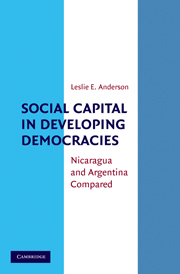Preface
Published online by Cambridge University Press: 05 June 2012
Summary
When I was a doctoral student at the University of Michigan I rode a Yamaha 150 motorcycle around Central America so that I could more easily reach the rural poor, my subject of study. I continued to ride that motorcycle long after I finished my dissertation because it was the best and cheapest way to get around in Nicaragua. But it was a rough-and-tumble way to do research, and I got into trouble plenty of times. I got stuck in the mud. I had flash floods reach up over the handlebars. I ran out of gas. I knocked the chain off the gear wheel. Whenever I got into trouble, the Nicaraguans helped me out, rescued me, found me a pint of gas somewhere, leveraged the bike out of two feet of oozing mud, fixed the bike, replaced and oiled the chain, kept it running.
The Nicaraguan people were poor, always and everywhere, but their generosity toward me and toward each other never ceased to amaze me. Those who had nothing always seemed to have something to give. Although the Nicaraguans were certainly not saints, they had a stoic kindness, a willingness to pitch in, reach out, buckle down, work together. That willingness was so evident everywhere in the country, in rural and urban areas, and so constant over time that in the first ten years of my research on Latin America, I came to take it for granted, to consider it Latin American.
- Type
- Chapter
- Information
- Social Capital in Developing DemocraciesNicaragua and Argentina Compared, pp. ix - xivPublisher: Cambridge University PressPrint publication year: 2010

